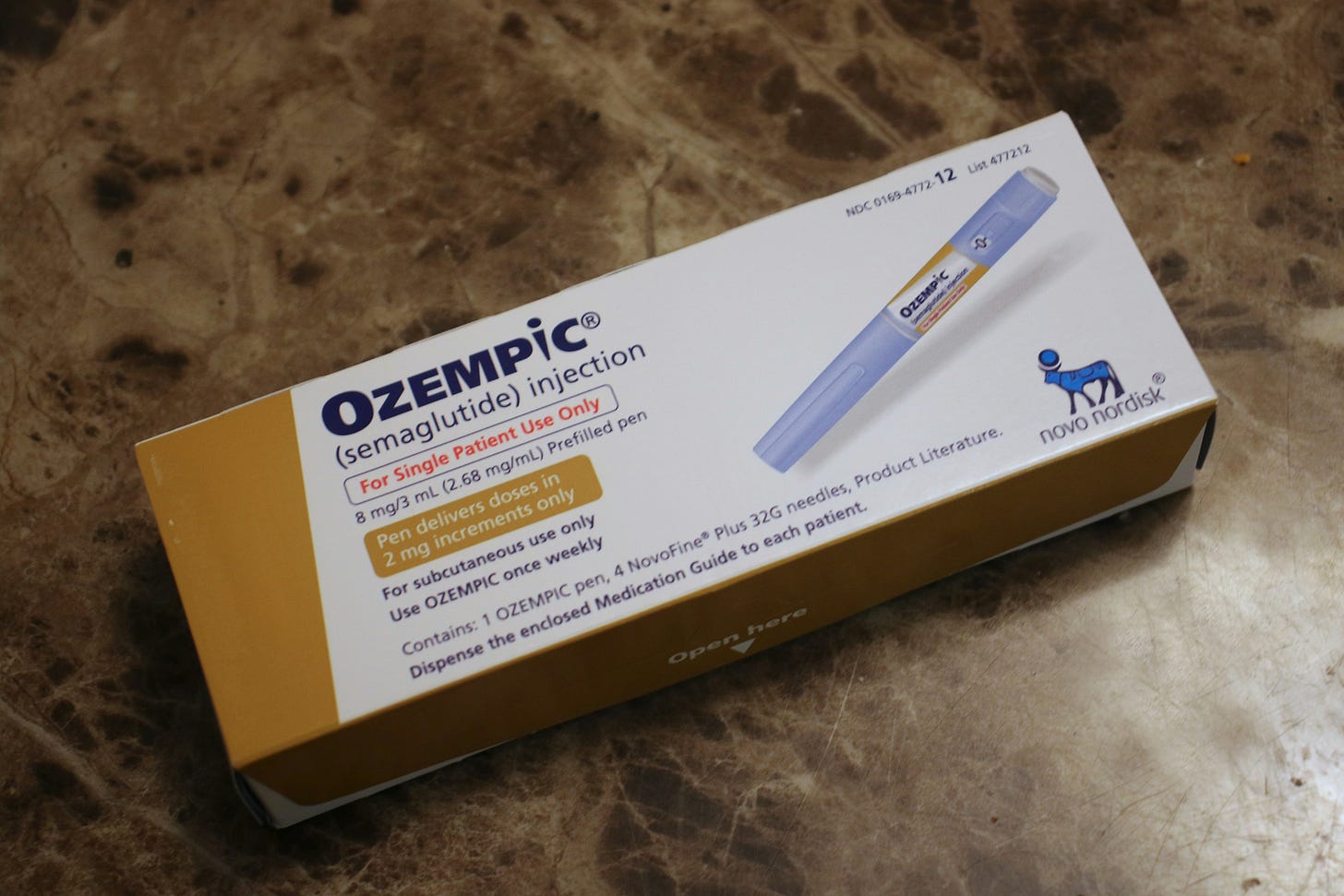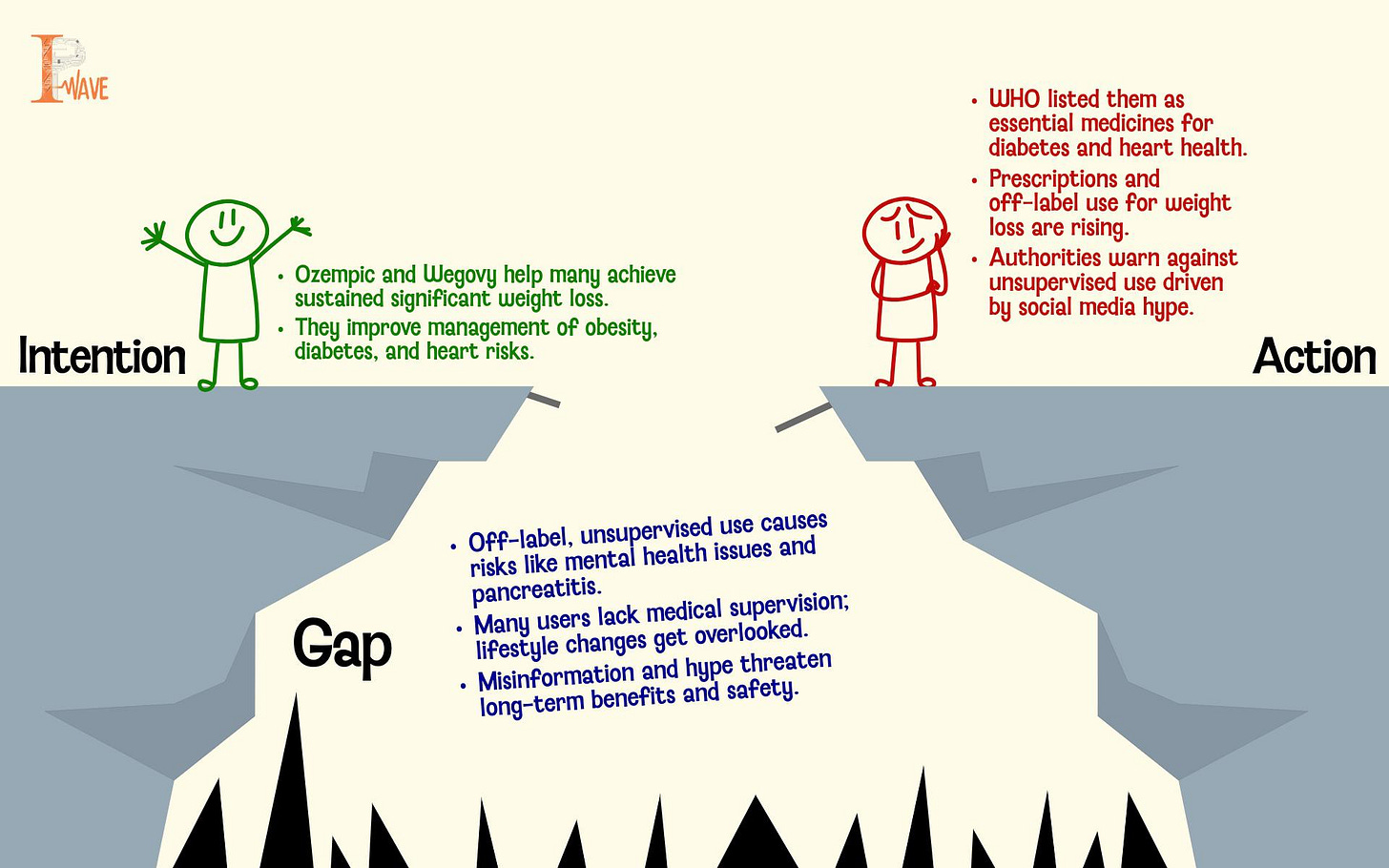Ozempic and Wegovy: Beyond the Hype
Semaglutide sold under brand names like Ozempic and Wegovy, is creating a wave of excitement among those who struggled with obesity. Clinical trials demonstrated that patients have lost more than 15% of their body weight, a result unmatched by earlier treatments. For instance, if someone weighing 100 kg, that could mean losing around 15 kg or more.
For years, obesity was framed as a personal responsibility and simply a failure of willpower “eat less, exercise more, and try harder”. GLP1 drugs have shifted the narrative, reframing obesity as a chronic disease with biological roots rather than just lifestyle choices.
The World Health Organization (WHO) recently added both Wegovy and Ozempic to the Essential Medicines List of their clinical benefits, for heart disease, stroke, and diabetes and kidney complications but not for obesity alone. Meanwhile, new oral drugs like Orforglipron, for diabetes and weight loss still in the late-stage trials, may soon offer the treatment easier to injections. Earlier evidence suggesting strong weight-loss potential combined with other benefits for liver disease, sleep apnea, and even cardiovascular prevention.
For public health systems, the potential is huge. If obesity is managed better, countries could save billions in future healthcare costs. But they also raise questions about cost, inequality, culture, and long-term safety.
From Hype to Market Buzz
Rising demand for Ozempic and Wegogy, for weight loss raising ethical and safety concerns. Rising off-label prescriptions, often influenced by social media trends and celebrity endorsements becoming prominent through online platforms and unregulated sales. In the UK, Medical experts caution that unregulated and inappropriate use outside of Type 2 diabetes treatment can endanger lives. that misuse could lead to serious health problems including the mental health problems, pancreatitis, and gallbladder disease.
India has also seen a troubling rise in safe semaglutide products, putting lives at risk and violating drug laws. Alarmed, the Delhi High Court, have expressed concern over the unregulated use of these drugs in gyms and wellness centres, often without appropriate medical supervision calling for stricter rules. At the same time, Indian pharmaceutical firms are expected to grow strongly with new generic versions coming soon.
The Indian Context: Opportunity and Misinformation
Wegovy launched in India in mid-2025 specifically approved for chronic weight management in people with morbid obesity. The arrival of these drugs has caught public attention not only because of their medical benefits but also due to interest sparked by famous Indian celebrities. A celebrity mother noticing celebrities magically losing weight tried Ozempic injections and Semaglutide tablets and reduced 15 kgs in 3 months.
Stories like these have made the internet and social media buzz with questions and excitement for dramatic weight loss transformations. But while the hype is real, it also raises some important questions:
Are these drugs always prescribed by qualified doctors?
Is selfuse without supervision putting patients at risk?
And are lifestyle changes such as diet and exercise being sidelined in the rush for quick fixes?”

Lifestyle vs Quick Fix
In India, the market for these drugs boomed for GLP-1 drugs, fuelled not only by obesity and diabetes rates but also gym culture and beauty clinics promoting them as slimming injections. Experts Caution! these drugs aren’t for everyone.
As per official labeling guidance by FDA and CDSCO (India’s drug regulator) as of 2025, Wegovy can only be used with a low-calorie diet and regular exercise to aid and manage weight loss. It is only prescribed for people with a Body Mass Index of 27 or higher, have high blood pressure, type 2 diabetes, or high cholesterol. However, overreliance on GLP-1 agonists overshadowing lifestyle modifications. When treatment ends, many patients rapidly regain weight quickly, highlighting the risk of dependence on drug without a healthy lifestyle.
Opportunities and trade-offs
So, GLP-1 drugs are changing the weight loss conversation in India, while they come with both opportunities and trade-offs. On one hand, better management of chronic diseases could save billions. On the other, misinformation, offlabel misuse, and neglect of preventive care risk undermining these gains. Regulators have to balance different needs, one is encouraging new drug innovations but sold under ethical way with clear information to the users and, while emphasizing lifestyle modification.
Amid all the hype, there is a strong consensus that GLP-1 drugs are not a quick weight loss fix. They only complement but not replace ongoing lifestyle changes including diet, exercise, and behavioral interventions.


